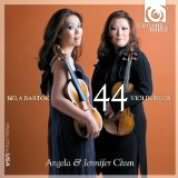Bartók composed his 44 violin duos for pedagogical purposes, yet their vibrant folkloric character, rhythmic inventiveness, and effortless canonic writing contains much musical substance. The Chun sisters group these pieces for maximum flow and contrast, and hold nothing back. Note, for example, the marked timbral differentiation the violinists achieve in Nos. 25 and 34, the internal “swing” propelled by their emphatic accents in Nos. 32, 35, and the four “New Year’s Greeting” pieces, and their imaginatively shaded pizzicatos in No. 43. The Mosquito Dance’s tricky cross-rhythms come off with delightfully “stinging” aplomb, while even the easiest selections benefit from the Chuns’ tonal and expressive generosity.
Perhaps some collectors will find the immediacy and impact of Harmonia Mundi’s close-up engineering slightly abrasive next to the gentler, more resonant sonics of ECM’s edition featuring Andras Keller and Janos Pilz, whose generally faster and lighter interpretations remain a reference point. However, the Chuns’ caring, committed, and stylistically perceptive Bartók playing deserves serious consideration. [2/9/2010]
































